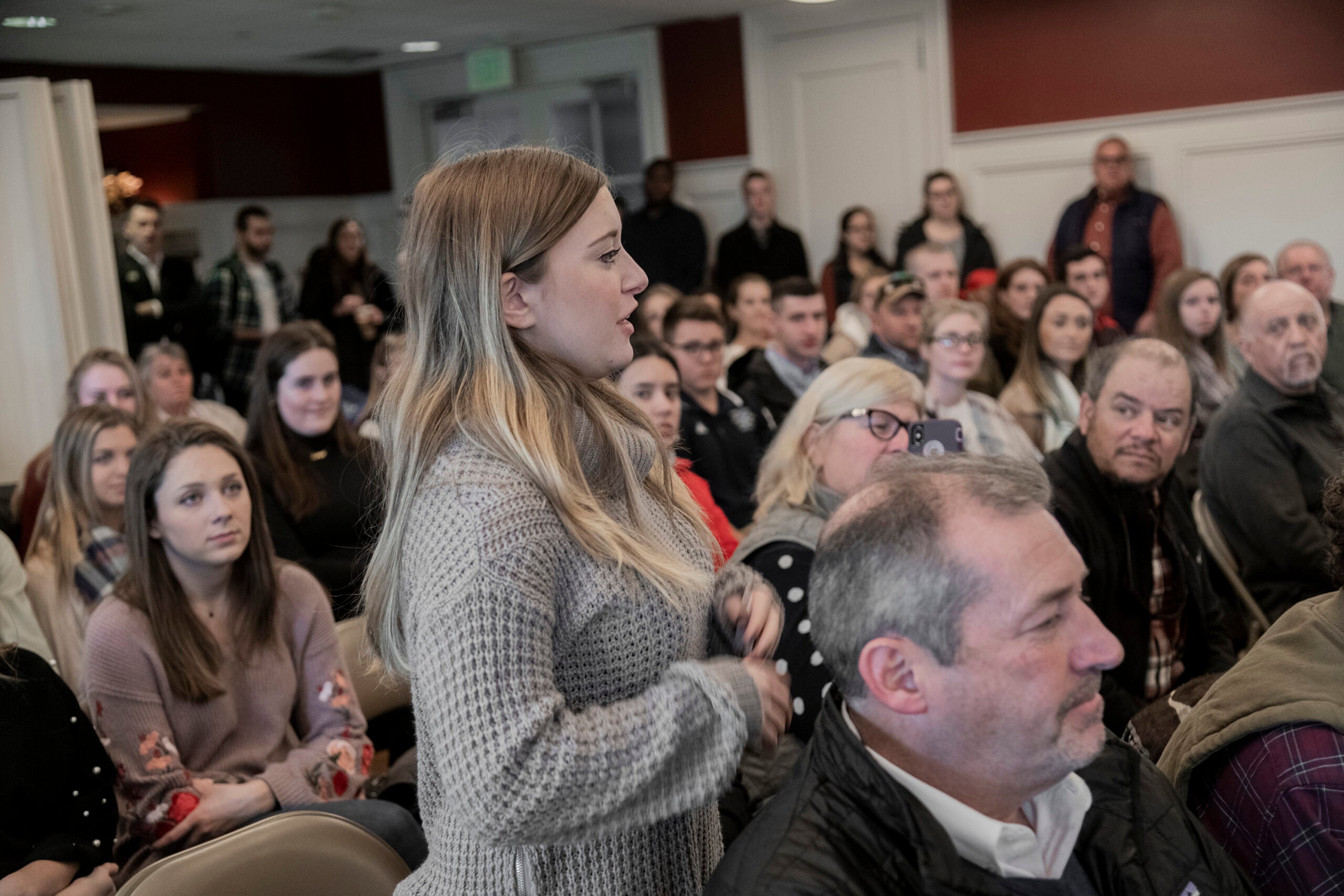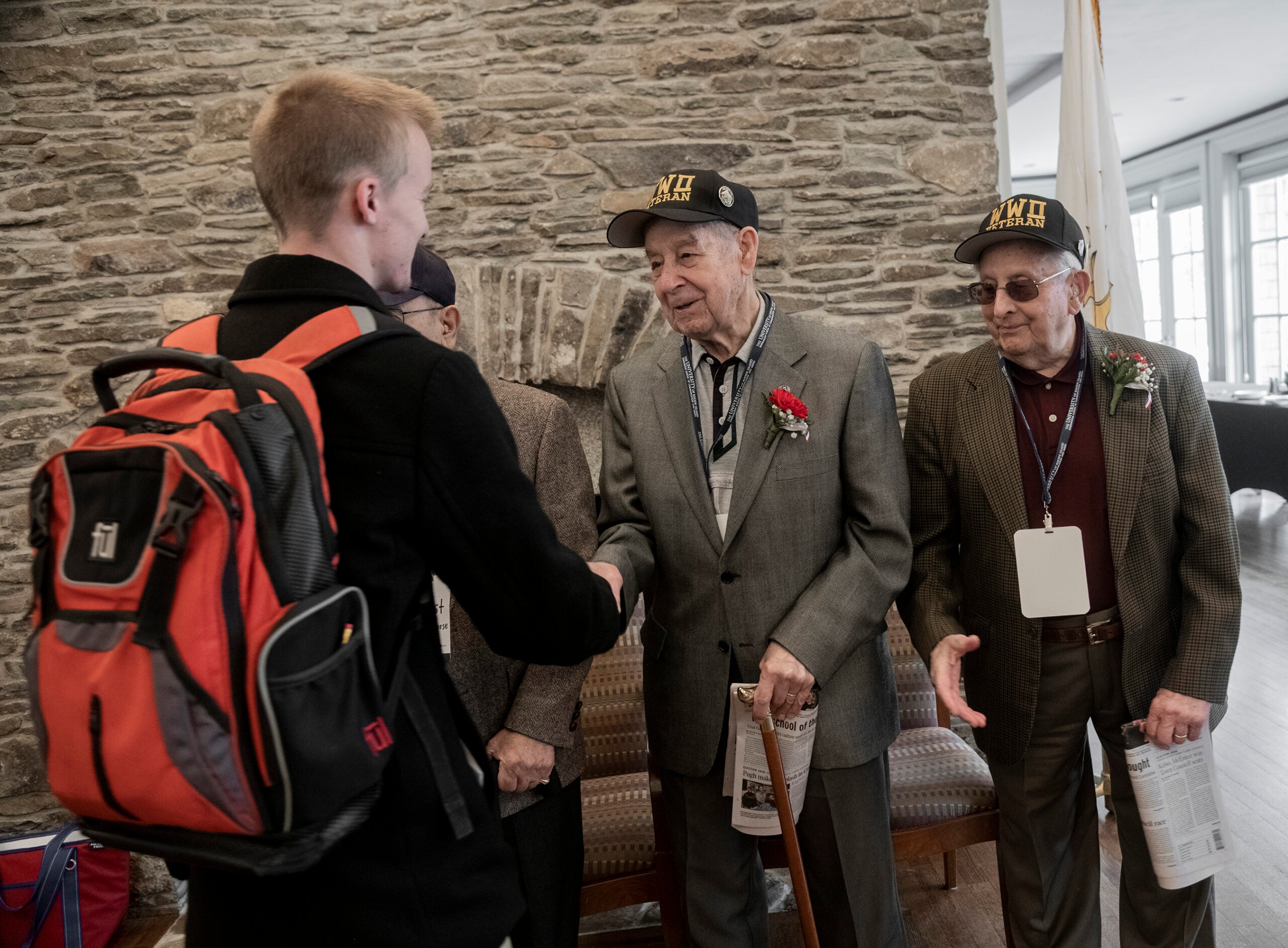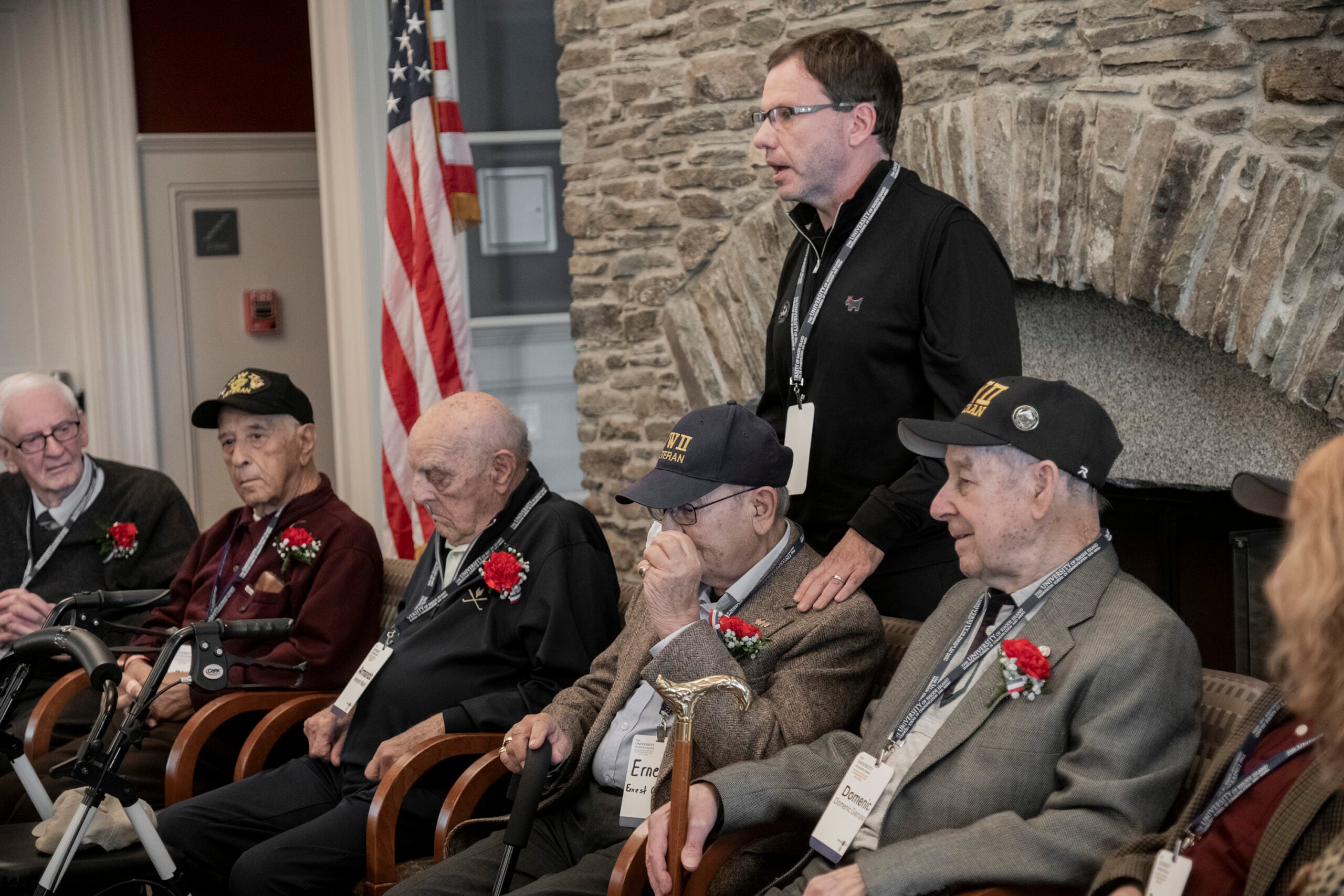KINGSTON, R.I. – Feb. 15, 2018 – Domenic Giarrusso’s World War II story started with a “baby doll.” It wasn’t a story of a G.I. and a pinup model. It was an actual baby doll.
Giarrusso enlisted in the Army Air Forces during his senior year at Central High School in Providence, and a girl at the school gave him the doll to remember her by. He carried it with him for about a year and a half – through basic training in Florida, through duty in North Africa and Italy with the 15th Air Force. The doll helped keep him connected to the homefront.
“That was something I treasured overseas,” Giarrusso, 96, of Cranston, R.I., told a standing-room-only crowd last week at the University of Rhode Island’s Alumni Center as a half-dozen World War II veterans talked about the realities and complexities of young men going off to war more than 75 years ago.

The roundtable discussion was organized by Regina Bell, a senior lecturer in public relations at the Harrington School of Communication and Media, and the 28 students in her Public Relations Strategies class. The event was coordinated with the help of filmmaker Tim Gray ’89, founder of the World War II Foundation and its Global Education Center in Wakefield, R.I.
More than 100 students and visitors crowded the Alumni Center community room for the question-and-answer discussion. At the front of the room, a line of veterans – all in their 90s, some with canes, one with a walker – sat facing the audience. Along with Giarrusso were: Joseph Aquilante, 92, of North Providence; Richard Fazzio, 93, of Woonsocket; Armando Napoli, 93, of Newport; Ernest Corvese, 92, of Smithfield; and Benjamin Carbone, 94, of Providence, along with Gene Peloquin, 85, of North Smithfield, who had three brothers serve in World War II.

Labeled “The Greatest Generation” by newsman Tom Brokaw, Gray called the veterans “The Humblest Generation.” World War II veterans, he estimated, number fewer than half a million today, dwindling daily by 400 to 500. “You have a rare opportunity today to witness history,” said Gray, who helped relay questions when veterans’ hearing failed. “The men that you see in front of you make up a very select group, the last group that can honestly say they saved the world.”
During the half-hour discussion, the stories provoked by the audience’s questions were riveting, some funny, some rousing, some hard to hear and harder to tell.
Giarrusso’s baby doll, which he stored on a shelf with his gear, was eventually confiscated by his commanding officer, he told the students. “My commanding officer was a VMI [Virginia Military Institute] grad,” he said later. “He was really strict. His favorite saying was, ‘Now that you’re in the service, give your soul to God because your ass is mine.’”
Of the girl who gave him the doll, they ended up getting married, he said.
Asked about the transition from civilian to military life, Giarrusso said: “We were coming out of the Depression years, we were trying to establish ourselves here at home and all of a sudden the war comes along. I felt I wanted to do my part. … Once you enlist, you do what you are told. You don’t ask questions … so that was an adjustment right there.”
“We thought we were doing a job that we had to do, and when we got drafted it was for the duration,” Aquilante, who served in the Army Air Forces and was at Okinawa, responded when asked if he ever felt the war was unwinnable. “There was no such thing as a discharge or a tour of duty. It seemed like there was no end.”
But some questions weren’t easily answered. Two veterans, Corvese and Fazzio, had witnessed the carnage at Omaha Beach on D-Day on June 6, 1944.
Corvese was part of an eight-man Navy demolition unit – one of the first ashore at the heavily defended beach – there to knock out German obstacles ahead of the Allied invasion. When he exited the unit’s rubber raft, Corvese was dragged under by the 60 pounds of gear on his back. Someone pulled him up, but when he looked for his unit, they were gone. A German shell had obliterated the raft. For a time, he was pinned down on the beach, looking for cover and witnessing unbelievable bloodshed.
Asked how he found the strength to go on, Corvese responded, “I tell you I was scared, and don’t let anyone say they weren’t scared. I was scared.”
“When I went looking for my crew, I couldn’t find them,” he said, unable to continue.
“I’ve asked that question a few times,” said Gray, helping to finish the story. “That’s the reality of what he went through. Next year is the 75th anniversary of D-Day. Seventy-five years later, it still affects him this way.”
Fazzio’s view of D-Day was no less emotional. He was in the first wave of Higgins boats ferrying infantry troops to one of the most heavily defended sectors. “When we got in there, we could hear the bullets hitting against the boat and right away I started thinking of my mother,” he said. “I kept praying, ‘I hope she doesn’t get one of those telegrams.’”
The first wave of Allied troops on Omaha suffered a 50-percent casualty rate, and the troops Fazzio transported met with devastating fire. “I looked around and I could see soldiers being ripped off the beach, see soldiers getting drowned. It was awful.”
Fazzio was shot through the left shoulder, but was able to turn his boat around and complete his mission. His mother ended up receiving a telegram, he said. Four months later, his brother was killed in the Pacific.
Allen Santucci ’20, a major in public relations, who asked Fazzio about his experience on D-Day, was taken by the emotion of the discussion. “I thought it would be intense for some people but the whole room was on edge listening to their stories. You could feel for what they’d been through.”
“It was so interesting to hear all the different stories and see the emotion they brought while telling them,” said Brittney Allen ’21, also a public relations major. “I got choked up myself knowing that they were my age when they went through this.”
“I thought it was amazing, what all these men have been through,” said Brendan Nolty ’20, a major in communications and public relations, whose father served in Afghanistan. “It made me relate to what my father has been through in a way.”
Closing the roundtable, Nolty asked the veterans whether, if as young men today, they would serve.
In near unison, they answered, “Absolutely.”

